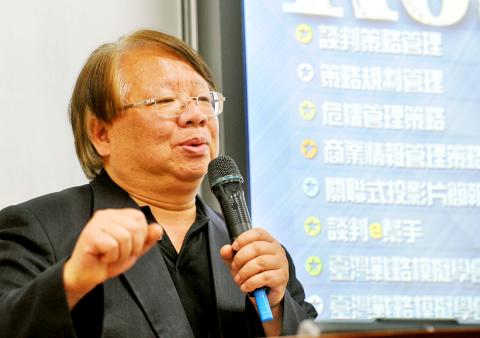Former National Security Council (NSC) deputy secretary-general Chang Jung-feng (張榮豐) yesterday criticized current council head King Pu-tsung’s (金溥聰) visits last month to local intelligence units, calling them the beginning of the collapse of the national security system.
Chang’s criticism follows former council secretary-general Ting Yu-chou’s (丁渝洲) comments a day earlier accusing King of over-reaching his authority and questioning President Ma Ying-jeou’s (馬英九) over-reliance on his confidants.
To understand the gravity of King’s actions requires an understanding of how the presidential decisionmaking process works, Chang said.

Photo: Taipei Times
The council, formally institutionalized on Dec. 30, 1993, is patterned after the US’ National Security Council — a government body that aids the president in policy and decisionmaking, Chang said.
The presidential decisionmaking process consists of four steps: analyzing the problem; coming up with possible solutions; making the decision; and executing and supervising it, he said.
The council’s role involves the first two, which is to aid the president in making decisions on cross-strait, national defense and diplomatic affairs, Chang said, adding that during former president Lee Teng-hui’s (李登輝) term, it was strictly forbidden for the council to intervene in domestic affairs.
The fact that the council is responsible only for problem analysis and offering potential solutions — but not decisionmaking — is the reason it is called an “aiding and counseling” body, Chang said.
Chang said the decisionmaking process is completed by the president holding a national security conference. After reaching a decision, the president would then appoint an official to oversee policy implementation. The person in charge — who might be the NSC secretary-general, the premier, or the Mainland Affairs Council minister — varies in accordance with the nature of the mission.
The NSC would need, for problem-solving, the ministries, other councils and the National Security Bureau (NSB) to provide information about the mission or policy, Chang said, adding that the NSB in turn has six major intelligence units responsible for gathering information.
All information would be processed and appraised by the NSB for the president to make decisions and for the NSC to analyze the problem.
Chang said that if King could “visit” the six major intelligence units whenever he wants to just to show them “who’s the boss,” that would be interference with the functions of the other units.
This could give rise to inter-unit infighting as some attempt to curry favor with the “boss,” which in turn would hamper their ability to fight the nation’s real enemies, he said.
With a weakened intelligence system, the NSC, Ma and King would be on the receiving end of a torrent of information that they, without the requisite skills, would be unable to handle and process, rendering the information useless, he said.

SECURITY: As China is ‘reshaping’ Hong Kong’s population, Taiwan must raise the eligibility threshold for applications from Hong Kongers, Chiu Chui-cheng said When Hong Kong and Macau citizens apply for residency in Taiwan, it would be under a new category that includes a “national security observation period,” Mainland Affairs Council (MAC) Minister Chiu Chui-cheng (邱垂正) said yesterday. President William Lai (賴清德) on March 13 announced 17 strategies to counter China’s aggression toward Taiwan, including incorporating national security considerations into the review process for residency applications from Hong Kong and Macau citizens. The situation in Hong Kong is constantly changing, Chiu said to media yesterday on the sidelines of the Taipei Technology Run hosted by the Taipei Neihu Technology Park Development Association. With

CARROT AND STICK: While unrelenting in its military threats, China attracted nearly 40,000 Taiwanese to over 400 business events last year Nearly 40,000 Taiwanese last year joined industry events in China, such as conferences and trade fairs, supported by the Chinese government, a study showed yesterday, as Beijing ramps up a charm offensive toward Taipei alongside military pressure. China has long taken a carrot-and-stick approach to Taiwan, threatening it with the prospect of military action while reaching out to those it believes are amenable to Beijing’s point of view. Taiwanese security officials are wary of what they see as Beijing’s influence campaigns to sway public opinion after Taipei and Beijing gradually resumed travel links halted by the COVID-19 pandemic, but the scale of

A US Marine Corps regiment equipped with Naval Strike Missiles (NSM) is set to participate in the upcoming Balikatan 25 exercise in the Luzon Strait, marking the system’s first-ever deployment in the Philippines. US and Philippine officials have separately confirmed that the Navy Marine Expeditionary Ship Interdiction System (NMESIS) — the mobile launch platform for the Naval Strike Missile — would take part in the joint exercise. The missiles are being deployed to “a strategic first island chain chokepoint” in the waters between Taiwan proper and the Philippines, US-based Naval News reported. “The Luzon Strait and Bashi Channel represent a critical access

Pope Francis is be laid to rest on Saturday after lying in state for three days in St Peter’s Basilica, where the faithful are expected to flock to pay their respects to history’s first Latin American pontiff. The cardinals met yesterday in the Vatican’s synod hall to chart the next steps before a conclave begins to choose Francis’ successor, as condolences poured in from around the world. According to current norms, the conclave must begin between May 5 and 10. The cardinals set the funeral for Saturday at 10am in St Peter’s Square, to be celebrated by the dean of the College